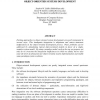Free Online Productivity Tools
i2Speak
i2Symbol
i2OCR
iTex2Img
iWeb2Print
iWeb2Shot
i2Type
iPdf2Split
iPdf2Merge
i2Bopomofo
i2Arabic
i2Style
i2Image
i2PDF
iLatex2Rtf
Sci2ools
103
click to vote
ISOOMS
1994
1994
A Seamless Model for Object-Oriented Systems Development
Existing approaches to object-oriented system development are poorly integrated in several ways. This inadequate integration is ubiquitous and causes numerous inefficiencies in the object-oriented development process. These problems can be addressed by abandoning typical object-oriented models in favor of a single, seamless system model. By using a seamless model, such as the one we propose, not only do we overcome the integration inefficiences to which we allude, but we also e level of abstraction for object-oriented system implementation and enable same-paradigm system evolution.
ISOOMS 1994 | Object-oriented | Object-oriented Development Process | Programming Languages | Typical Object-oriented Models |
Related Content
| Added | 10 Aug 2010 |
| Updated | 10 Aug 2010 |
| Type | Conference |
| Year | 1994 |
| Where | ISOOMS |
| Authors | Stephen W. Liddle, David W. Embley, Scott N. Woodfield |
Comments (0)

